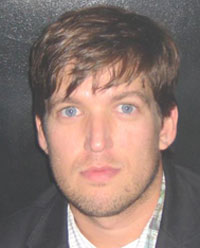Greg Hajcak

Stony Brook University, The State University of New York
www.psychology.stonybrook.edu/ghajcak-/
What does your research focus on?
My laboratory focuses on cognitive and affective science and their intersection with psychopathology (anxiety, depression, and psychosis). We are particularly interested in emotion–cognition interactions: how attention, emotion, and cognitive control relate to one another — including the topic of emotion regulation, which has become hot over the past few years. We are also interested in the converse: how motivation and emotion influence processes that are seemingly “cognitive.” Our research tools include psychophysiological, neurobiological, and behavioral measures — we work a lot with EEG and ERPs, the startle reflex, and increasingly, integrating multiple measures. We are very interested in whether individual differences in these processes might serve as concomitants of, and markers of risk for, psychopathology. Although most of our work has been in adults, we are increasingly studying children and developmental processes in my lab.
What drew you to this line of research? Why is it exciting to you?
As an undergraduate, I was really drawn to neuroscience and psychophysiology as methods for understanding psychology. At the same time, I suffered with “so what?” doubts. For me, the application of psychological science to understand psychopathology makes the enterprise both more exciting and meaningful. I get to have it both ways: I can study basic processes and focus heavily on methods, as well as apply this work towards understanding psychopathology.
Who were/are your mentors or psychological influences?
Bob Simons at the University of Delaware was a fantastic mentor in graduate school — and was extremely influential in my development as a psychophysiologist. Bob was Peter Lang’s student, and I continue to be influenced by that tradition and the excellent work that comes out of the Lang/Bradley lab in Florida. I received outstanding clinical training for four years from Edna Foa and her group at the University of Pennsylvania; Edna and others there (Marty Franklin, Jonathan Huppert) helped shape the way I think about research in anxiety disorders and psychological treatment. Over the years, I have received (and continue to receive) a good deal of mentoring from my friends and colleagues — to whom I’m very grateful (the full list is on my lab website).
To what do you attribute your success in the science?
I have been lucky to receive great mentorship; more recently, I would attribute my lab’s success to outstanding students, top-notch colleagues, collaborators, and friends. I am also deeply grateful to the Society for Psychophysiolgoical Research (SPR) for a warm and intellectually stimulating environment, as well as for continued support and mentorship from its members. In terms of personal characteristics, I think it helps that I continually get excited about psychological science, and work hard.
What’s your future research agenda?
Our research will continue to focus in parallel on a better understanding of basic cognitive/affective processesand translational utility and implications. We’ll continue to use multiple methods and work on integrating them (i.e., EEG and fMRI, EEG and eye-tracking). One example of an area that we’re increasingly focused on is reward sensitivity. In terms of basic work, we’re interested in refining neural and behavioral measures of reward sensitivity and its quantification, and understanding factors that impact reward sensitivity. In terms of translational work, we’re very interested in reward from the perspective of individual differences and psychopathology. We’re also continuing to do work on error-related brain activity, as well as emotion–attention interactions — in these instances we are doing both basic work and examining how they relate to individual differences and psychopathology.
Any advice for even younger psychological scientists? What would you tell someone just now entering graduate school or getting their PhD?
Only do this if you absolutely love it — and I mean head-over-heels infatuation with psychological science. You are going to work more than you thought possible, for relatively little pay. On the upside, if you are doing something you love, it doesn’t much feel like work. In terms of more concrete suggestions: Learn computer programming, and increase your understanding of statistics whenever you can; go to conferences and talk to people who are doing things you find exciting, and collaborate.
What publication you are most proud of or feel has been most important to your career?
The ethos in my lab, and the spirit I took from graduate school, is one of systematic replication. Any one of our papers is an incremental contribution; for me, the value is derived from a larger context of multiple studies. What I am most proud of — and what I think might be most important to my career — is that my work is programmatic, consistent, and hangs together to tell a progressively more precise story on a given topic.





APS regularly opens certain online articles for discussion on our website. Effective February 2021, you must be a logged-in APS member to post comments. By posting a comment, you agree to our Community Guidelines and the display of your profile information, including your name and affiliation. Any opinions, findings, conclusions, or recommendations present in article comments are those of the writers and do not necessarily reflect the views of APS or the article’s author. For more information, please see our Community Guidelines.
Please login with your APS account to comment.